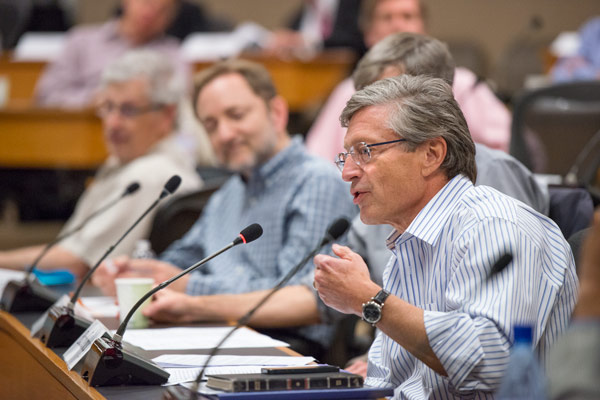This Thursday, the Faculty Senate convened for the first time this quarter to discuss reports about undergraduate education and IT policy while bidding adieu to departing Provost John Etchemendy.
Etchemendy’s final report to the Faculty Senate described his thought process behind accepting the Stanford Band’s appeal to be put on probation instead of sustaining the initial suspension for two quarters. He articulated that the Band had eloquently argued that a suspension would not address the Band’s problems, and the Band had proposed an alternative approach to make the cultural and organizational changes necessary. Etchemendy received a standing ovation for his work as Provost.
Etchemendy also ended his remarks with advice for interacting with the new leadership.
“There’s been a remarkable decline in trust for any kind of leadership,” Etchemendy said. “The only thing I want to say is that the first time [incoming Provost Persis Drell] or [President Marc Tessier-Lavigne] makes a decision that you think is just stupid … step back and pause for a moment, and think that before you attribute ill will, remember that they are trying to do their best.”
Tessier-Lavigne also briefly commented about the recent acts of intolerance performed on campus. He affirmed Stanford’s support of its community members, stating that, “All members of our community belong here at Stanford.” Tessier-Lavigne later specified that this statement included undocumented immigrants. In addition, due to a leaked possible executive order restricting immigration to the country, Tessier-Lavigne also stated that the administration is reaching out to members of the Stanford community who would be affected by this possible order, although he also argued that the situation was very much in flux.
On top of these executive reports, professor of pathology and genetics Andy Fire briefly summarized the Task Force on IT Privacy and Security. Fire mentioned that the task force has created a generalized policy for dealing with requests for University information from both inside and outside of Stanford, such as a request from the U.S. Senate to obtain information on students from Middle Eastern countries after the 9/11 terrorist attacks. In addition, Fire articulated that although work has been done to improve security, nobody should assume that someone cannot read their emails.
On top of this IT report, professor Russell Berman, the Chair of the Planning and Policy Board (PPB), briefly described the situation regarding students’ curricular choices and gave recommendations from the PPB on these issues. Ultimately, Berman articulated that the drift toward STEM in and of itself was not an issue; rather, marginalizing non-STEM students was the true issue. Consequently, he recommended that the University come up with a comprehensive communication strategy about the work of a liberal arts education, strengthening advising and promoting better breadth in admissions. He also argued that redesigning the curriculum of non-STEM fields, providing opportunities to explore different fields beyond the major and improving pedagogy could help address this imbalance.
Contact Christina Pan at capan ‘at’ stanford.edu.
